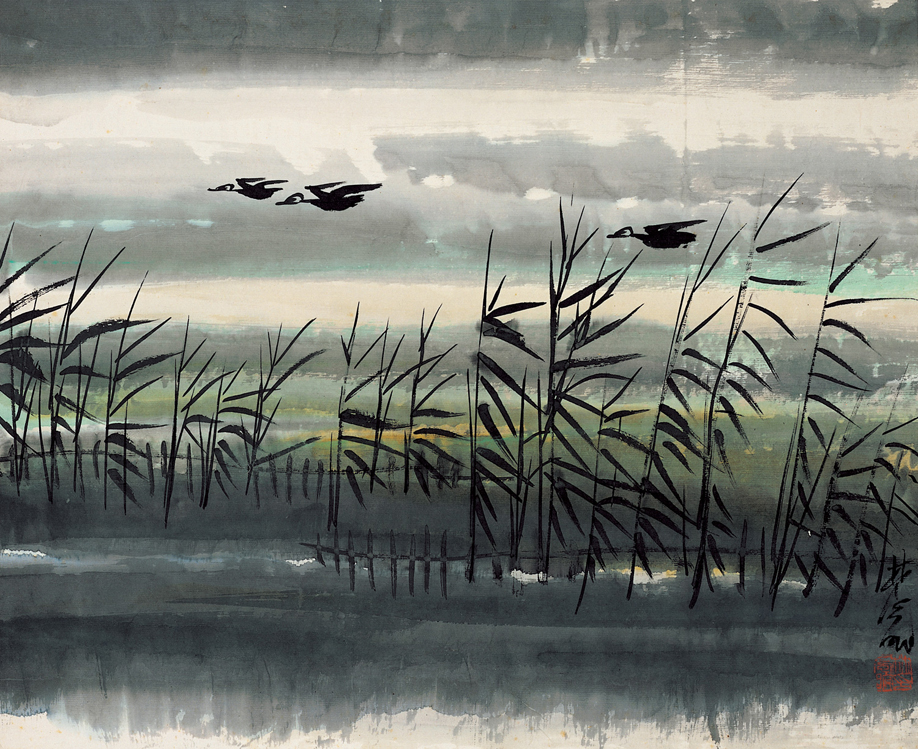

Lot 140
Reeds and Wild Geese
LIN Fengmian (Chinese, 1900 - 1991)
1970-1978
Ink and color on paper
40 x 50.5 cm
Estimate
TWD 1,800,000-2,800,000
HKD 439,000-683,000
USD 60,000-93,300
Sold Price
TWD 2,460,000
HKD 629,156
USD 81,108
Signature
With one seal of the artist
PROVENANCE:
Ancient collection of Chung Kiu Products Emporium Ltd., Hong Kong
Collection of Sanhuai House, Hong Kong
ILLUSTRATED:
Zhou Weiming ed., Collection of Art Garden Studio No. 72: Sanhuai House's Modern Chinese Paintings, People Fine Arts Publishing House, Shanghai, 2004, color illustrated, p. 19
+ OVERVIEW
The Reeds and Wild Geese series is one of the themes wherein Lin Fengmian most closely approaches traditional Chinese paintings, and its tone resembles Chinese paintings as well. The technique used to depict the reeds is closely linked to traditional brush strokes, originating from the lines painted on porcelain; the shape of the wild geese follows the bird designs of the Shichuan Han Dynasty stone reliefs; this is why Lin Fengmian's paintings of reeds and wild geese have been admired by older masters of Chinese paintings.
The birds in Lin Fengmian's paintings are sometimes called "Geese", but sometimes "Herons", though geese and heron belong to the same genus. Wild geese are birds that fly in flocks, but if there's some calamity then there are lone geese as well, so Ling Fengmian's reeds and wild geese landscape paintings are considered to be one of his most characteristic themes. There is the sky, the shoreline with water flowing from the top down and laid out horizontally. With all of the birds flying quickly into the scene from right to left, this gives an impression of movement and poetry. The geese that he paints may be alone or in twos and threes, flying through the reeds against the wind under a gloomy sky. This harks back to symbolism of strong winds bringing out the tenacity in grass, and a world in chaos revealing the loyal vassals.
In 1962 within the article 'Expression, Communication and Other Matters' Lin Fengmian mentioned that his inspiration for reeds and wild geese paintings originated from an unusual experience at West Lake in Huangzhou. He said: "Many years ago, while I was living at West Lake in Huangzhou, I kept having these rubella attacks. My family and doctor wanted me to take walks every day, so every afternoon I would walk all along the Su Levee. It was around autumn, and all this walking back and forth meant that I enjoyed the scenery at West Lake in it's entirety for three or four months. Sometimes a flock of wild birds would sweep by low across the tranquil lake surface along the reeds, and scenes such as this have become imprinted on my mind though I had no intention of painting them at the time. After the Liberation I lived in Shanghai, and one day I thought of the line 'Clear islet, white sands, the birds return' from a poem by Du Fu...so I began painting these kinds of paintings. Sometimes the painting is set on the lake, or on a calm river, and ultimately it developed into a variety of backgrounds through which to express different tones..." (originally published in the "Wen Hui Bao" on January 5, 1962)
West Lake in Huangzhou was an important way station in Lin Fengmian's life, and though it wasn't far away from Shanghai, the vicissitudes of life meant that after he left his teaching position at the Huangzhou Art College, he lived quietly in Shanghai before moving to Hong Kong for his final years. The image of geese flying low across the reeds on West Lake has always remained in the depths of his memories. This is why the art historian Lang Shaojun noted: the reeds and wild geese paintings were not paintings of actual landscapes, but in fact painted from memory incorporating elements of imagery. In their conception they resembled traditional landscape artists whose ideals were "View the imagery in repose after countless journeys" and "See all the wondrous mountains before coming up with a draft". Unlike traditional landscape artists however Lin Fengmian's concern was not with his predecessors' themes, techniques or styles. Instead, his focus was on the experience of actual objects. Based on the pencil drafts he left behind, Lin Fengmian had in fact sketched actual landscapes just like Western artists who would make practice sketches in order to grasp the subject and specific features. So Lin Fengmian did not imitate or modify the experience or models set by past artists, nor did he make completely true-to-life depictions of the landscape. He instead continued to refine his own personal experiences in order to create a new language of painting.
The "Reeds and Wild Geese" painting listed for auction was originally in the possession of the Chung Kiu Products Emporium Ltd, then was purchased by the renowned Hong Kong collector Sanhuai House. It has been carefully preserved in the hands of the collector for many years. In the "Reeds and Wild Geese", vigorous stalks of reeds have been created through quick, sweeping brush strokes, giving an impression of neatness and strength like the brushed lines on porcelain. Wild geese skim by low across the water in twos and threes creating a sensation of speed. Despite the heavy clouds, the rays that come through gaps in the cloud and the waters of the lake created through the use of white powder creates a sense of relief and transparency. The yellowish greenery in the middle elevates the scene's brightness, making this a reeds and wild geese painting in which the artists has expressed a rarely seen feeling of happiness.
Modern & Contemporary Asian Art
Ravenel Autumn Auction 2010 Taipei
Sunday, December 5, 2010, 2:30pm
